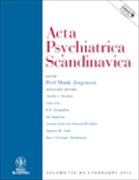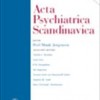Posts
Trauma, Dissociation, Attachment & Neuroscience: A new paradigm for understanding severe mental distress
/1 Comment/in Articles, Publications /by JacquiSpecial Edition: Complex reactions to severe trauma
The paper by Dillon, Johnstone & Longden in this volume (Trauma, Dissociation, Attachment and Neuroscience) brings together evidence from the neuroscience and mental health literature with the hope that this might lead to a paradigm shift in the way that people are seen and helped. Hopefully they are right, and biopsychosocial models worthy of the name may come to dominate practice, rather than models that sometimes masquerade as biopsychosocial but which are basically ‘bio-bio-bio models’, with social and psychological factors reduced to mere events that trigger an underlying genetic illness (Read, Bentall & Fosse, 2009).
JCPCP is a peer-reviewed journal which values personal experience above professional boundaries and doctrinal jargon. It provides a forum for ideas, experience and views of people working in the psychological world and those who use psychotherapy or receive psychiatric services. The journal encourages a critical, reflexive view of psychology and counselling and is a constant challenge to orthodoxy. Our contributors reflect on their work and experiences in therapy, in relationships and in institutions. The journal embraces philosophical, radical and scientific perspectives in its analysis of psychological, psychiatric and psychotherapeutic systems. With a following wind, it will sometimes make you laugh out loud.
She gives us all deep insights, courage, and powerful ideas.
/0 Comments/in Feedback /by JacquiWe have been gifted to have Jacqui deliver training for us in Melbourne, Australia, and look forward to her third installment in May this year.
Jacqui’s messages continue to resonate here in Australia, and we are so happy to see more and more mental health workers willing to work with the impacts of trauma.
People who have attended Jacqui’s training tell us frequently how deeply it has affected them, and how much they have learnt, and changed, as a result. She gives us all deep insights, courage, and powerful ideas.
Don’t stop this important work Jacqui – your gifts are immeasurable!
Indigo Daya, Project Manager, Voices Vic, Melbourne, Australia.
Bad Things That Happen to You Can Drive You Crazy!
/7 Comments/in Events /by Jacqui I’m feeling elated after an amazing evening at Mount Holyoke College in Massachusetts. The event, sponsored by Mount Holyoke College Department of Psychology and Education, the Western Massachusetts Recovery Learning Community, and the Freedom Center was attended by about 150 people – students, academics and people from the local community – some as far away as Boston, Connecticut and Pittsburg. The auditorium was packed with people hungry for an alternative to the pharmaceutically driven, biomedical model which dominates so heavily in America. Many were inspired when they heard Ron Coleman and Paul Baker speak late last year and there is a growing momentum for the development of the Hearing Voices Network in America. Change is happening.
I’m feeling elated after an amazing evening at Mount Holyoke College in Massachusetts. The event, sponsored by Mount Holyoke College Department of Psychology and Education, the Western Massachusetts Recovery Learning Community, and the Freedom Center was attended by about 150 people – students, academics and people from the local community – some as far away as Boston, Connecticut and Pittsburg. The auditorium was packed with people hungry for an alternative to the pharmaceutically driven, biomedical model which dominates so heavily in America. Many were inspired when they heard Ron Coleman and Paul Baker speak late last year and there is a growing momentum for the development of the Hearing Voices Network in America. Change is happening.
My talk, entitled: “Bad Things That Happen to You Can Drive You Crazy! Understanding Abuse, Trauma, and Madness and Working toward Recovery”,
(see this link for further information: http://www.mtholyoke.edu/news/stories/5682743)
seemed to really resonate with others experiences and many people were clearly questioning the adequacy of a biomedical model to make sense of and respond to human distress.
I began by reading ‘A Tale of An Ordinary Little Girl’ and then spoke about the groundbreaking work of the Hearing Voices Movement, its success in many other parts of the world and our intention to revolutionise the way societies think about hearing voices and other unusual human experiences. I ended by stressing the imperative to take collective responsibility for the ills in our societies, to become aware of the dominant ideologies that redefine reality and to challenge oppression, power, social norms and inequalities. I appealed to everyone to join the last great civil rights movement – fighting for the rights of those labelled as mentally ill.
As always, a number of survivors came up to me afterwards and thanked me for telling ‘their’ story. Lots of people wanted to find out more about how they could get involved in the movement, meet with others, start groups. People are impatient for a paradigm shift in the way we understand and respond to human suffering which is now, long overdue. Many are in anguish. Fortunately, there are already some fantastic Hearing Voices Groups running in the area, with several new groups in development. I left feeling proud, inspired and grateful to be part of such a wonderful, powerful movement for change in the world.
There is still so much work to be done. First, it’s time for a bath and then bed.
Transforming pain and loss into a force for good
/0 Comments/in Feedback, inspiring /by JacquiI have had the pleasure of hearing Jacqui speak on numerous occasions, and – once – the honour of running a training programme with her, for 100 psychiatrists – on when and how to take abuse histories. Jacqui is a remarkable person who knows how to harness pain and loss and transform it into a force for good.
I can unreservedly recommend her to anyone considering running a mental health training or education event. You will be inspired and informed at the same time.
Professor John Read, Psychology Department, University of Auckland.
There Is A Fault In Reality Film
/4 Comments/in Film /by Rai Directed By: Tom Cotton, 2010, Tigerlily Films
Directed By: Tom Cotton, 2010, Tigerlily Films
Roughly 1% of people in the UK suffer from something called ‘schizophrenia’, yet there is little agreement about what this represents, what causes it, or how best to treat it. Despite the thousands of research studies carried out, if you’ve been diagnosed with this ‘disease of reality’, it is extremely unlikely that anyone will have asked you about your experiences – these are not considered scientifically meaningful. All these contradictions pose an important question: if ‘schizophrenia’ represents a fault in reality, with whom does this fault lie?
In There is a Fault in Reality, writer, director and psychotherapist Tom Cotton explores the stories of three people – Jon, Peter and Jacqui, who’ve all battled with the diagnosis of ‘schizophrenia’ in different ways, and with varying outcomes. Through them, we enter a detailed insider’s view of ‘schizophrenia’, which bears little resemblance to what we think we know. As their stories unfold, the voices they hear are revealed to have clear meanings, and to have identities that are anything but ‘mad.’
‘A moving and informative film about ‘schizophrenia’ – real stigma buster.’ Professor Richard Bentall, Award winning author of Madness Explained and Doctoring the Mind
‘This is one of the most important films ever made about psychosis.’ Professor John Read, award winning researcher and co-author of Models of Madness, and Prejudice and Schizophrenia.
Available to buy from : http://www.pccs-books.co.uk/products/there-is-a-fault-in-reality-a-film-by-tom-cotton/#.UYpmEOBFtbw
Madness Radio (June 16, 2009)
/0 Comments/in Radio /by RaiWhat is it like to hear voices? How do people learn to live with their voices, and are voices sometimes positive and helpful? What is the connection between voices and trauma? Jacqui Dillon, voice hearer and director of the UK Hearing Voices Network, discusses how the movement of people who hear voices is creating self-help alternatives to traditional and often abusive mental health care.
Listen: http://www.madnessradio.net/madness-radio-hearing-voices-movement-jacqui-dillon
From Vicarious Trauma to Transformation
/8 Comments/in Reflections /by RaiI’ve just got back from delivering a 2 day training course with Eleanor Longden on Abuse, Trauma and Dissociation, to 35 mental health professionals in Shrewsbury. I was really struck by people’s willingness and commitment to staying with some really difficult material. We spoke about the importance of having good support and the need to take really good care of ourselves when working directly with trauma, to protect us from the effects of vicarious traumatization.
Vicarious trauma, the process of change that happens because you care about other people who have been hurt, and feel committed or responsible to helping them, can lead to changes in your psychological, physical, and spiritual well-being. When you identify with the pain of people who have endured terrible things, you bring their grief, fear, anger, and despair into your own awareness and experience. Your commitment and sense of responsibility can lead to high expectations and eventually contribute to your feeling burdened, overwhelmed, and perhaps hopeless. Vicarious trauma, like experiencing trauma directly, can deeply impact the way you see the world and your deepest sense of meaning and hope. Vicarious traumatisation is not the responsibility of clients. Organisations that provide trauma-related services bear a responsibility to create policies and work settings that facilitate staff (and therefore client) well-being. Each trauma worker is responsible for self-care, working reflectively and engaging in regular, frequent, trauma-informed supervision. There are many ways of addressing vicarious traumatisation. All involve awareness, balance, and connection.
Beyond vicarious traumatisation lies vicarious transformation. This is the process of transforming one’s vicarious trauma, leading to spiritual growth. Vicarious transformation is a process of active engagement with the negative changes that come about through trauma work. It can be recognized by a deepened sense of connection with all living beings, a broader sense of moral inclusion, a greater appreciation of the gifts in one’s life, and a greater sense of meaning and hope. Vicarious transformation is a process, not an endpoint or outcome. If we can embrace, rather than fending off, other people’s extraordinary pain, our humanity is expanded. In this receptive mode, our caring is deepened. People who have suffered trauma and abuse can feel that we are allowing them to affect us. This reciprocal process conveys respect. We learn from trauma survivors that people can endure horrible things and carry on. This knowledge is a gift we can pass along to others.
Due to popular demand we will be offering further courses this year on Abuse, Trauma and Dissociation in Nottingham, Cork and in London. See events section for further information.
Latest Updates
- Drop the Disorder – And then what?!29/10/2021 - 6:48 PM
- Intervoice Congress 202131/08/2021 - 7:18 PM
 BBC Breakfast: Jacqui and Rai talking about Hearing Voices on TV18/07/2021 - 8:07 PM
BBC Breakfast: Jacqui and Rai talking about Hearing Voices on TV18/07/2021 - 8:07 PM Jasper Gibson & Jacqui Dillon in conversation at AD4E Festival05/05/2021 - 3:37 PM
Jasper Gibson & Jacqui Dillon in conversation at AD4E Festival05/05/2021 - 3:37 PM Jasper Gibson and Jacqui Dillon, In Conversation – Fiction about Psychosis: Impact, ethics, effects05/05/2021 - 2:45 PM
Jasper Gibson and Jacqui Dillon, In Conversation – Fiction about Psychosis: Impact, ethics, effects05/05/2021 - 2:45 PM




